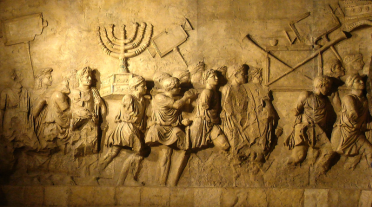Every week, parshaoftheweek.com brings you a rich selection of material on parshat hashavua, the weekly portion traditionally read in synagogues all over the world. Using both classic and contemporary material, we take a look at these portions in a fresh way, relating them to both ancient Jewish concerns as well as cutting-edge modern issues and topics. We also bring you material on the Jewish holidays, as well as insights into life cycle rituals and events...
One of the interesting aspects of the Chanukah holiday is the law stipulating how we are meant to light the Chanukah menorah. The halacha emphasizes, again and again, that the candles, which commemorate the victory of the Macabbees against the Greek empire, the rededication of the Temple in Jerusalem, and the miraculous rekindling of the menorah, must be visible to passersby. The whole point of lighting the candles is pirsumey nissa – publicizing the miracle that took place at the time of the Macabbees. The Chanukiyah must not be placed too high, or too low, or in a place where it is not visible, or at a time when there is no one around to see it. Rather, it should be lit outside of our doorways, or in the window, where it is visible for all to see.
This demand for publicity stresses that this commandment, and this celebration, is not meant to be done secretly or privately; it is not for our eyes only. This particular Jewish custom – and there may be others like it - is meant to engage us in a dialogue with the general public, the people who walk past our homes and front yards, whoever they might be. This mitzvah is not just for us to enjoy and contemplate; it is meant to be a communication from us to the outside world.
What is implied by this insistence that we light the Chanukah lights in a way and a place which announce the holiday to the general public? Why is it so important to publicize the miracles of the defeat of the Hellenist Empire and the eight-day-long burning of the oil, rather than simply commemorating them, as we do with many other mitzvoth, in the privacy of our own homes or synagogues, individually or in the family circle?
This insistence on announcing to all and sundry what Chanukah is about is especially strange, given the fact that Chanukah is often understood as a celebration of our rejection of an “outside” culture: Hellenism. One might have thought that this battle for Jewish life and culture against Greek life and culture would be celebrated privately, in a totally Jewish environment. After all, the war was all about not getting too involved in a foreign culture, separating from it, rejecting it; why celebrate it so outwardly, so publicly, in a way which invariably connects us with whoever is out there?
The explanation would seem to be that, in fact, Chanukah should not be seen as a war against Hellenism, per se. The Talmud and the later codes emphasize that the Hasmoneans went to war against the Seleucid Empire because they oppressed the Jewish people, and attempted to force them to give up their Judaism. Had the Greeks simply argued for their way of life, debated politely with the Jews, rather than steal our temple and persecute our people, I am not at all sure there would have been a war. That kind of dialogue would have been acceptable. It was the oppression we fought, the persecution, not Greek culture itself.
This being the case, it makes perfect sense that we light the menorah in a public fashion. We do it in order to make it clear that Chanukah is not about separating ourselves from or rejecting out of hand cultures or values which are outside of our own. We light the menorah in the window, or outside the doorway, to invite discussion, debate; to announce who we are and what we believe in, knowing full well that this could result in others wanting to tell us who they are, and what they believe in. That’s just fine. It was the cruel persecution of the Jews and the attempt to forcibly erase Judaism the Macabbees fought against, not dialogue.



Get inspired by Hanukkah Divrei Torah from previous years